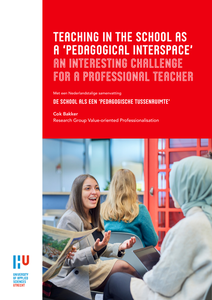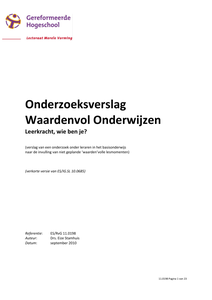Dit artikel beschrijft een praktijkgericht onderzoek waarbij een lectoraat van een hogeschool samenwerkte met leraren, interne begeleiders en stagiairs van drie basisscholen uit het Samenwerkingsverband WSNS regio 41-07 uit Gorinchem en één basisschool uit de Oostzaan. Deze basisscholen hebben ervoor gekozen de komende jaren een inclusieve onderwijspraktijk te ontwikkelen, waarin leerlingen met een beperking of met specifieke onderwijsbehoeften kunnen participeren in reguliere schoolklassen. Leraren en stagiairs zouden actief worden betrokken als medeonderzoekers van de eigen beroepspraktijk als deelnemers binnen een participatief actieonderzoek. Het onderzoek bestond uit vier fasen: een oriënterende fase, een onderzoeksfase bestaande uit een verkennende en een reconstructie fase en een afsluitende fase. Dit artikel beschrijft per fase de doelstellingen en de verworven inhoudelijke inzichten op het gebied van inclusief onderwijs in het licht van sociale rechtvaardigheid. In de conclusie worden de verschillende deelresultaten bij elkaar gebracht en besproken. Een belangrijke uitkomst van het onderzoek is dat leraren hun leidende positie zijn gaan nuanceren. Ze gaven meer ruimte aan leerlingen om een eigen verantwoordelijkheid te nemen. Hierdoor ontstond in de klassen een organische orde die minder afhankelijk was van interventies van de leraar. De leerlingen bleken beter in staat om hun eigen balans te vinden.
DOCUMENT

This article explores how schools can function as a pedagogical in-between space, or a pedagogical inter-space, and how lecturers can act professionally within this space, of which they themselves are also a part. Met een samenvatting in het Nederlands: De school als een ‘pedagogische tussenruimte’.
DOCUMENT

There is a central dilemma embedded in the relationship between teachers and researchers. Teachers know the story of the classroom well, but they are seldom asked to tell their stories, nor do they usually have the opportunity. Researchers, on the other hand, are skilled at telling certain things about classrooms, but they often miss the central stories that are there. This divergence can lead to different opinions on what teaching is about and what is important within it. To bridge this gap, we describe an approach which puts the teacher and the student at the centre. With respect to emotional and behavioural problems of students, we underline the notion of student-teacher compatibility, deriving from theories emphasizing the transactional/reciprocal nature of human behaviour. One of the aims of the Lectorship and Knowledge Network Behavioural Problems in School Practice, is to identify at-risk-teachers (i.e. those most vulnerable to the presence of behaviourally challenging students and parents) so that interventions, both in initial teacher training as well as in inservice training can be applied to help them develop adequate attitudes and coping-skills. In clinical supervision, peer coaching or reflective practice, these teachers can be helped to consider in what way student and parental problem behaviour contribute to their loss of satisfaction, their feelings of self doubt, perceived disruption of the teaching process, and their frustration working with parents.
DOCUMENT

Verslag van een onderzoek naar wat leerkrachten in het basisonderwijs waardevolle onderwijsmomenten vinden. Door middel van een logboek hebben leerkrachten een maand lang bijgehouden wat voor hen de meest waardevolle momenten zijn in hun interactie met de kinderen. Vervolgens werd met de leerkrachten gereflecteerd op de uitkomsten, om na te gaan welke waarden in het spel zijn. Op deze manier is getracht uiteindelijk terecht te komen bij de kern van het onderwijs van de leerkracht. Voor welke waarden staat de leerkracht en hoe raakt hij hierover in gesprek met de kinderen? Het bezig zijn met waardenvol onderwijs staat in het kader van het invulling geven aan de pedagogische opdracht van het onderwijs. In het theoretische gedeelte wordt deze pedagogische opdracht van het onderwijs verder toegelicht [verkorte versie].
MULTIFILE

Deze rede is als volgt opgebouwd. Eerst wil ik kort stilstaan bij de twee termen in de naamgeving van het lectoraat. Dat vormt de opmaat naar de onderzoeksfocus van het lectoraat, namelijk de morele dilemma’s waar sociale professionals in hun dagelijks werk mee te maken krijgen en hun morele oordeelsvorming. Ik zal het belang schetsen van dit tot op heden onderbelichte thema. Tot slot zal ik aangeven hoe we dit onderwerp de komende jaren in de schijnwerpers gaan zetten via de programmering van onderzoeks- en ontwikkelactiviteiten.
DOCUMENT

Brede scholen zijn ontwikkeld om optimale opgroeimogelijkheden te creëren voor kinderen. In dit rapport staat de praktijk van de Utrechtse brede scholen centraal en de wisselwerking tussen praktijk en beleid. We analyseerden de jaarplannen van elf Utrechtse brede scholen, interviewden de bredeschoolcoördinatoren over de vertaling van de jaarplannen naar de praktijk en hielden per brede school een focusgroepgesprek met een gevarieerde groep betrokken professionals over ambities en resultaten. Het doel van het rapport is inzicht te geven in de pedagogische ambities en resultaten van de Utrechtse brede scholen. Ook geven we inzicht in de processen die de implementatie en evaluatie van de ambities bewerkstellingen dan wel belemmeren. Met dit rapport hopen we de Utrechtse bredeschoolprofessionals te inspireren en aanknopingspunten te bieden voor de verdere ontwikkeling van de Utrechtse brede scholen.
DOCUMENT

Huidige inburgeringscursussen zijn meestal gericht op taal en kennis en houden geen rekening met de complexe inspanningen die migranten moeten leveren om een nieuw bestaan op te bouwen in een vreemde samenleving. Sinds 2002 onderzoekt en ontwikkel ik samen met Vantrood Educational Services methoden voor psychosociale volwassenenonderwijs, toegespitst op een dubbele context benadering: de ontvangende samenleving, evenals de volwassen lerende migrant. In dit Position paper beschrijven we de theoretisch gefundeerde principes van deze effectieve pedagogische aanpak en bespreken we veronderstellingen van volwassenenonderwijs en inburgering om hiermee een constructieve bijdrage te leveren aan de doorontwikkeling van inburgeringscursussen.
MULTIFILE

In dit slothoofdstuk proberen wij betekenis te geven aan de hoofdstukken die in deze bundel bijeen zijn gebracht en we gaan na welke antwoorden we hebben verzameld op de twee centrale vragen van het Kennisprogramma Complexiteit in Beroepsuitoefening: 1. Hoe kunnen professionals in en tussen onderzoek, onderwijs en praktijk bekwaam handelen in complexe praktijken? 2. Op welke wijze kan met behulp van opleiding en scholing en praktijkgericht onderzoek de kwaliteit van de beroepsuitoefening van hoger opgeleiden in complexe praktijken verder worden verhoogd? Het hoofdstuk bestaat uit vier delen. Na een paar algemene observaties over het proces vatten we het antwoord op de onderzoeksvragen samen in vier handelingsopties voor het omgaan met complexiteit. Die illustreren we aan de hand van de bijdragen in deze bundel. Vervolgens gaan we in op de dilemma’s en uitdagingen in het omgaan met complexiteit en we besluiten met een paar aanbevelingen voor Hogeschool Utrecht.
DOCUMENT

In dit hoofdstuk wordt het Nederlandse beleid geschetst van het tegengaan van radicalisering en het voorkomen van terroristisch geweld. Hierin neemt het ‘Actieprogramma integrale aanpak Jihadisme’ een belangrijke plaats in. Besproken wordt wat er goed gaat en wat de ontwikkelingsvragen zijn. Het hoofdstuk eindigt met een beschouwing over de behoefte aan sociale innovatie. Aangezien een aantal preventieve interventies behoorlijk ingrijpend kunnen zijn, is het zaak om bij de uitvoering te letten op eenduidigheid en adequate rechtsbescherming.
DOCUMENT

In deze afscheidsrede worden verschillende onderwijsthema’s en onderzoeken besproken die in een lectoraatsperiode van 2004 tot 2018 de revue zijn gepasseerd. De kern van het onderzoeksprogramma was, met accentverschillen in de loop der jaren, opgebouwd rond een aantal thema’s, die in dit boek aan de orde komen: − Maatschappelijke, culturele en persoonlijke vorming (Bildung & burgerschap); − Pedagogisch klimaat en omgaan met verschillen; − Samen pedagogisch handelen (ouders, brede school, IKC); − Activerend, onderzoekend en ontwerpend leren. Daarnaast is er aandacht voor onderzoek in en samen met het werkveld, opleiden in de school en beroepsvorming.
DOCUMENT
